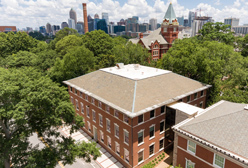Sponsored Research
The National Science Foundation has awarded Seymour Goodman, professor in The Sam Nunn School of International Affairs, $49,670 in additional funding for the Federal Cyber Service Scholarships at Georgia Tech. That brings the grand total for the award to $1,300,352.
The National Science Foundation has awarded Seymour Goodman, professor in The Sam Nunn School of International Affairs, $39,100 for the project “Facilitating Constructive Interaction among Scholarships for Service (SFS) Institutions.
The National Aeronautics and Space Administration (NASA) has awarded John Krige, professor in the School of History, Technology, and Society, $75,625 for the project “Controlling the Flow of Sensitive Knowledge in an Interconnected World.”
Alexandra Mazalek, associate professor in the School of Literature, Media, and Communication, received $22,166 from the University Of Georgia for the work in the “Peanut Collaborative Research Support Program.”
Julia Melkers, professor in the School of Public Policy, has received $76,077 from the University of Kentucky for the project “Evaluating the Kentucky National Science Foundation EPSCoR R11 Grant 2009-13: Transforming Kentucky’s New Economy.” That brings the grand total for the project to $130,099.
Faculty Books
Critical Insights: Technology & Humanity (Salem Press) edited by Carol Colatrella, professor in the School of Literature, Media, and Communications. From the automata of the ancients to humanity's fascination with time travel and robotics, this volume in the Critical Insights series explores the myriad ways technology has influenced the world's literature and film.
What Does Georgia Tech Think?
Selected Press for Ivan Allen College of Liberal Arts
|
November 1, 2012
11:30 am
November 2, 2012
10:00 pm
November 12, 2012
4:00 pm
|

|
IAC ELECTION PERSPECTIVES
Faculty and student political research and 2012 campaign experiences
|
If It Really is All About the Economy, Which Presidents Have Performed Best?
During presidential campaigns, it’s not unusual to hear candidates say they will focus on strengthening the nation’s economy. But once in the White House, which presidents have truly delivered on that promise?
When it comes to shoring up the nation’s economy, Franklin D. Roosevelt, Warren G. Harding, and Rutherford B. Hayes top the list, while William Henry Harrison, Herbert Hoover, and Martin Van Buren rank at the bottom, according to a new study by the Georgia Institute of Technology.
.jpg) The first-of-its-kind study analyzed up to 220 years of data to estimate an economic “grade point average” for presidents who served from 1789 until 2009. The research, conducted by Mark Zachary Taylor, assistant professor in The Sam Nunn School of International Affairs, appears in the October edition of P.S. Political Science & Politics. The first-of-its-kind study analyzed up to 220 years of data to estimate an economic “grade point average” for presidents who served from 1789 until 2009. The research, conducted by Mark Zachary Taylor, assistant professor in The Sam Nunn School of International Affairs, appears in the October edition of P.S. Political Science & Politics.
On Taylor’s report card, William McKinley and Millard Filmore round out the top five, and founding fathers George Washington and John Adams are still on the honor roll with a grade of A-. Notable presidents like Harry Truman and John F. Kennedy rank slightly lower in the A-/B+range. Bill Clinton and Ronald Reagan are the best-rated recent presidents earning a grade of B.
Most existing presidential ranking systems tend to be clouded by partisan bias, subjective judgments and other aspect of presidential performance, Taylor said. This economic ranking system is based on objective, statistical data and is meant to be a serious way to gauge presidential economic performance.
“Put simply, if ‘It’s the economy, stupid,’ then we need to make stronger efforts to properly judge economic performance and to assign credit and blame where they are most deserved,” Taylor said. “These rankings are meant to constitute a scientific step in this direction.”
Taylor analyzed up to 220 years of data from the Measuring Worth Project at the University of Illinois at Chicago. He then graded the presidents individually using the traditional A-F (4-0 point) scale based on how well each performed in eight economic areas. Taylor used multiple and competing statistical measurements, ranking algorithms and time lags to ensure the data was unbiased. No historical or ethical judgments were used to adjust the findings.
Taylor’s objective approach yielded some surprises, such as the high ranking of presidents who traditionally have been poorly regarded like Harding, Hayes, and Fillmore. Also some national heroes – Abraham Lincoln, James Madison, John Quincy Adams, and Andrew Jackson – receive D's for poor economic performance.
“It makes sense when you dig into the history,” Taylor said. “In the case of Lincoln, to fight a war, you have to print money and go into debt. That’s bad for the economy in the long run, but sometimes there are more important things than the economy, such as staying together as one nation.”
Taylor also found correlations between the characteristics of presidents and their economic performance. For example, presidents who have been good for the U.S. economy tend to belong to pro-business political parties, work with a Congress in which only one house is dominated by their same party, serve during wartime and were raised in middle-class environments.
Presidents with below average economic performance often belong to parties that are relatively pro-farmer, pro-laborer, or pro-consumer. They tend to enter a single-party federal government in which one congressional house flipped parties, and they typically were raised in lower-class environments, the research shows.
Interestingly, presidential economic performance did not correlate with the person’s pre-political career, birth order, historical “greatness,” or whether he was a “dark horse” versus a well-vetted president, Taylor said.
Taylor cautions that these findings refer to the past performance of a group and cannot be applied to the 2012 election to predict whether Republican nominee Mitt Romney or U.S. President Barack Obama would be better for the economy. The study also did not include President Obama’s first term because it is not completed and the data will not be available until 2015, Taylor said.
What the research does suggest is that a president can affect the economy, even though the executive branch may appear on paper to have a limited role.
“It is tempting to dismiss these rankings as the product of dumb luck: getting elected at the top or bottom of the business cycle,” Taylor said. “Randomness surely plays some role in these rankings but presidents also bear responsibility for making their own luck.”
|
Modern Elections Start in Plato’s Cave: Klein brings 2,000 year-old insights to new technology
A few weeks back, Hans Klein was a personal witness to the power of political persuasion.
“My nine-year-old daughter said in the most amazed tone of voice, ‘President Obama wrote me an email,’” he recalled.
The associate professor in the School of Public Policy knew that his daughter’s email address must have landed on some list targeted by campaigns and other groups (“she also receives American Express applications”), but he couldn’t bring himself to burst her bubble. He told her that it was pretty cool she got a note from the President.
Klein takes a different approach with his students. He estimates that he teaches about 540 students annually in various sections of his philosophy course “Science, Technology, and Human Values.” There, students discuss and question tactics used in media manipulation. ‘Manipulation’ has intrinsic negative connotations, but that’s not always the case in practice.
Look at canned TV laughter, for example.
“It’s social proof. If everyone else is doing it, it must be true,” said Klein. Hearing laughter creates an environment where we know it is safe to do the same.
Campaigns have long utilized marketing strategies during election seasons. Klein cited an Italian election where voters were lured with a free bag of pasta if they voted. In Venezuela, voter qualifications are some of the most minimal in the world, Klein said, because President Hugo Chavez is aware that his support comes from those in the country’s lowest economic rungs. This year’s United States presidential election has seen telemarketers asking people to describe their routes to their voting stations with the idea that simply thinking of the path in advance increases the likelihood of following it to the poll on Election Day.
“Mobilization takes many forms,” Klein said. When it comes to fighting voter fraud or providing voting access, Republicans choose to fight fraud and Democrats opt for more access. Leaning towards one approach or another could change the results of an election.
“You assume they will not, but it may or may not be true,” said Klein.
Say you do a search for pizza recommendations using the Google search engine. Yelp is a popular site for restaurant reviews, but Google owns Zagat, a similar service. Google is motivated to show you Zagat ratings before Yelp, even if it’s a less-trafficked site. The results are true, but the search engine is "biasing the resulting you're getting," said Klein.
To help students recognize the media framework in which we live, he first requires them to read Plato’s Allegory of the Cave.
“Technology has changed, but media hasn’t changed in 2,500 years,” Klein said. The shadows on Plato’s cave wall are today’s media – your phone, your computer, the newspaper – all the sources from which we get information.
Klein knows Plato can seem “fuddy-duddy” to students. His solution? “Black jackets and lasers and hip hairdos,” he joked.
In other words, he has his students watch excerpts of the 1999 film "The Matrix." Klein knows not everyone has read Plato, but familiarity with landmark sci-fi film is practically a rite of passage for most Georgia Tech students. The parallels between the stories create a connection from the present to the past.
“Plato has a lot to say about new media,” Klein said. In turn, it gives Klein a lot to say about the present media landscape. In his words: “I bring 2,000 year-old insights to new technology.”
Klein has an undergraduate degree in engineering and computer science from Princeton. He worked for five years in software but found he wasn’t happy.
“I felt I had learned how to get the right answers,” Klein said. “You're empowered to solve problems, but it's also very important to define a problem too.”
He said those that can define a problem are “trained for citizenship.” Students studying liberal arts are grasping the theories that govern the republic.
They are also learning to question them. This way, the next time they see a candidate with a significant number of endorsements in a social media feed, instead of thinking “Two hundred people can’t be wrong,” Klein said, students are more apt to think critically about the number, and to consider that some of those endorsements may have been paid for.
Although it’s easy to get down about manipulation in media, Klein advises against defeatism. He calls his approach “critical optimism.” It’s not all a pack of lies, but ‘the truth’ is worth questioning.
And if your daughter is excited the President wrote her, Klein said it’s okay to save those questions for another day.
Related Links:
|
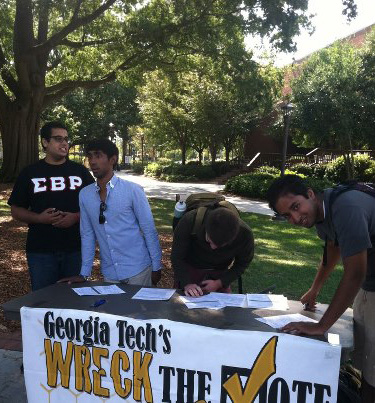
|
IAC Students Get Out the Vote
Andrés Celedón isn't eligible to vote, but still canvassed. Maddie Cook read President Obama's mail. Merry Hunter Hipp was tweeted by Mitt Romney. Jason Lupuloff started an online political newsletter. Students in the Ivan Allen College of Liberal Arts shared their 2012 election experiences.
-------
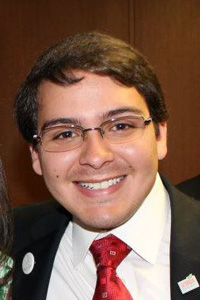 Andrés Celedón, believes it’s important for students to be politically aware regardless of voting status. The fourth-year Public Policy major from Colombia is not eligible to vote in the United States, but he's active with Georgia Tech College Republicans (GTCR) and campaigning for his party’s candidates, including presidential candidate Mitt Romney. Andrés Celedón, believes it’s important for students to be politically aware regardless of voting status. The fourth-year Public Policy major from Colombia is not eligible to vote in the United States, but he's active with Georgia Tech College Republicans (GTCR) and campaigning for his party’s candidates, including presidential candidate Mitt Romney.
“There’s no excuse not to vote if you’re eligible,” Celedón said. “You should do your own research or get in touch with GTCR or College Democrats at Georgia Tech to learn about the issues.”
-------
While many students have been spending fall weekends at Bobby Dodd Stadium or the library, Maddie Cook, a joint major in The Sam Nunn School of International Affairs and the School of Modern Languages, has been spending her final semester at Georgia Tech at an "Obama for America" field office in Jacksonville, Florida, working to get the 44th U.S. president elected for a second term.
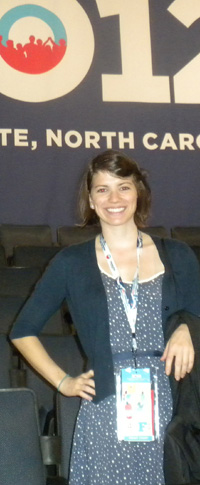 After working last fall as a White House information technology intern for presidential correspondence – which included the privilege of reading some of the president’s mail – Cook returned to campus inspired. She was ready to motivate others to engage in the political process and even made her case in a March editorial for the Technique. After working last fall as a White House information technology intern for presidential correspondence – which included the privilege of reading some of the president’s mail – Cook returned to campus inspired. She was ready to motivate others to engage in the political process and even made her case in a March editorial for the Technique.
“Apathy on our campus isn’t appropriate when, in many cases, we are going to be implementing [government] policies,” Cook said. During the spring, she worked with "Obama for America" to start a campus campaign group, "Jackets for Obama," and was a planning committee volunteer at the Democratic National Convention in September.
Georgia’s electoral votes are predicted to go to the Republican Party, but the Obama campaign sees Georgia as a support state for Florida, which has more electoral votes and a more volatile voting history. To garner votes and volunteers, the campaign uses phone banks to make calls and talk with people about their voting decision. Another tactic is going door to door to talk with voters in person, or canvassing. Both tactics have been shown statistically to drive votes.
“I was surprised to hear how many students said they were already registered and how many were willing to register at their school address to be able to vote there,” Cook said of campaigning at the University of Florida.
Though Florida students are voting in what is expected to be a highly contested state, student votes count no matter the geography, said Cook.
“Georgia Tech is highly recognized internationally and we should be educated about and speak out on the issues,” said Cook, who hopes to continue to garner volunteers and encourage students to vote. “Now’s the time to get involved.”
-------
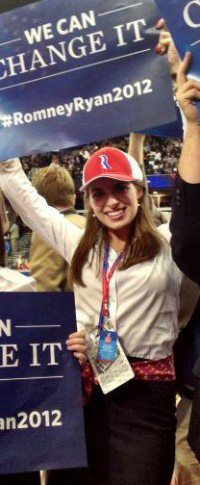 Her participation in Georgia Tech’s Georgia Legislative Internship Program in the office of Senate Majority Leader Chip Rogers – a Tech alum – along with stints as a communications intern in Governor Nathan Deal’s office and later as a legislative aide to Sen. Rogers, served to deepen Merry Hunter Hipp's political passion. That passion led her to seize a once-in-a-lifetime opportunity in August: serving on the whip team of the 2012 Republican National Convention (RNC) with the RNC page program. Her participation in Georgia Tech’s Georgia Legislative Internship Program in the office of Senate Majority Leader Chip Rogers – a Tech alum – along with stints as a communications intern in Governor Nathan Deal’s office and later as a legislative aide to Sen. Rogers, served to deepen Merry Hunter Hipp's political passion. That passion led her to seize a once-in-a-lifetime opportunity in August: serving on the whip team of the 2012 Republican National Convention (RNC) with the RNC page program.
“Because we’re in a red state, the governor nominates to the Republican convention, but I don’t think anyone, regardless of political party, would turn down such a chance,” said Hipp, a student in the School of Public Policy.
Her experience included distributing convention materials, leading chants within the arena and managing logistics to aid the convention’s operation, as well as being tweeted by Mitt Romney and brushing elbows with celebrities in news and politics.
“I talked to Diane Sawyer and stood 3 feet from a presidential nominee. I’m a news hound, so I was like a 5-year-old there. Being part of the process was amazing,” she said.
As the only Yellow Jacket to participate in the 2012 RNC page program, her collegiate affiliation was met with surprise.
“Everyone was impressed, I think because Tech students are usually so focused on academics that we aren’t always as politically involved. But I think that’s starting to change.”
Hipp has even seen interest among international students who may not be eligible to vote but want to be more aware of U.S. politics and processes.
“I follow politics for the people, not the party,” said Hipp, who calls her own political leanings undefined. She urges those who, like her, aren’t aligned with either the Republican or Democratic party to still research the candidates and decide who they think is better suited to be president.
“You may not be enthusiastic every time [you vote], but find out which candidate best fits what it is you want the future to look like. If you don’t cast a vote, you’re not taking charge of where the future is headed.”
-------
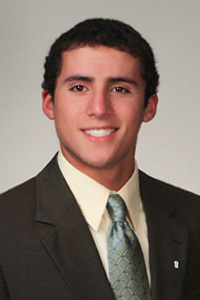 Jason Lupuloff, a third-year student in the School of Public Policy and the College of Engineering, hopes to ease the process of learning about candidates and issues for other students. With peers from Tech and other universities, Lupuloff started Why Gen Weekly, a website devoted to educating students about politics. Jason Lupuloff, a third-year student in the School of Public Policy and the College of Engineering, hopes to ease the process of learning about candidates and issues for other students. With peers from Tech and other universities, Lupuloff started Why Gen Weekly, a website devoted to educating students about politics.
“It’s for and by college-aged students and is done in a simple way,” said Lupuloff. New content each week is devoted to a specific political issue, with a news section complemented by columns from conservative, liberal, and libertarian students. Articles are kept concise because Lupuloff knows students are busy. The site's name comes from the "Generation Y" moniker given to the college-aged demographic and the spirit of inquiry Lupuloff hopes to inspire.
“I learned that the majority of my friends and peers aren’t that informed, and our age group isn’t as active as it should be,” he said. “In the 2008 election, nearly 50 percent of the college-aged demographic voted, but that’s not enough.”
Students can keep up with Why Gen Weekly as it posts new content each Monday at 5 p.m., as well as on Facebook and Twitter.
|
IAC IMPACT
Local, Regional, National, and International
|

|
Georgia Tech Cycling App is Assisting City of Atlanta
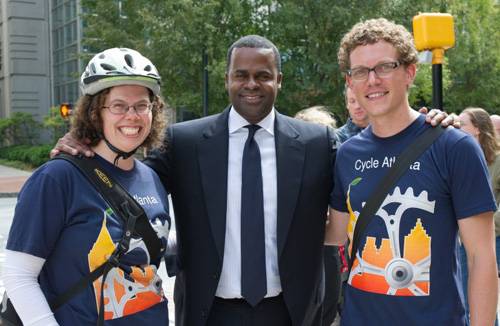
Pictured with Mayor Kasim Reed (c) are Kari Watkins and Chris Le Dantec
Atlanta Mayor Kasim Reed joined Georgia Tech President G.P. “Bud” Peterson October 12th in announcing several citywide cycling initiatives. Among them was Cycle Atlanta, a Georgia Tech-developed iPhone application that tracks cycling routes and is designed to help the city with future cycling decisions.
Once the free app is launched, cyclists tap “Start” to begin recording their ride. When the ride is over, they hit "Save" and add details such as trip purpose and optional comments. Cyclists are able to see a map of their ride, distance travelled, and average speed. The route is also uploaded to data servers, where city transportation planners have access to it.
“By looking at cyclists’ origins, destinations, and route, City of Atlanta transportation planners will be able to see which roads are avoided and which are popular,” said College of Engineering Assistant Professor Kari Watkins. “The city can use the information to make future decisions about where infrastructure is needed to create bike-friendly routes throughout Atlanta.”
Watkins developed Cycle Atlanta with Christopher Le Dantec, an assistant professor in the Ivan Allen College of Liberal Arts.
“One of the main reasons people don’t frequently cycle is a lack of safe infrastructure – dedicated bicycle routes, roads with bicycle lanes and other designated bicycle facilities,” said Le Dantec. “The city has a desire to put proper infrastructure in place but needs better information from citizens about where they currently ride and would like to cycle.”
Cycle Atlanta is a joint project by Georgia Tech, the City of Atlanta Department of Planning and Community Development, the Atlanta Bicycle Coalition (ABC), and the Atlanta Regional Commission (ARC). It’s funded through a contribution from ABC and the ARC’s Livable Centers Initiative planning program. Georgia Tech’s GVU Center and the Institute for People and Technology also provided support.
|
Nunn School Hosts Lithuanian Minister to Discuss Nuclear Weapons and Energy Security
Lithuania will be in the international spotlight in the second half of 2013 when it assumes the six-month rotating presidency of the European Union. Nuclear weapons and energy security issues were key topics during a roundtable discussion with a Lithuanian delegation hosted at Georgia Tech on September 28 by The Sam Nunn School of International Affairs.
Led by Foreign Minister Audronius Ažubalis, the delegation sat down with faculty and graduate students to discuss issues significant to the country's integration into the EU energy market. In 2009, Lithuania closed its last nuclear power plant, which had been generating 70% of its electricity. Today, Lithuania imports most of its natural gas from Russia at a high cost. Such a high dependence on imported energy has become an economic and industrial concern to Lithuania. The country has started building a new nuclear power plant with the support of the European Atomic Energy Community. Lithuania sees its integration into the EU electric grid network and energy market as the key to increasing its energy security.
Lithuania also pays special attention to nuclear safety. With help from the United States it is starting a nuclear security center to fight trafficking and smuggling of nuclear materials.
The Foreign Minister was very interested in INTA’s research in cyber security and its National Science Foundation’s Scholarship for Service program that trains the next generation of cyber security experts. A number of global companies have decided to locate their call and data centers in Lithuania, decisions motivated, in part, by what Lithuania has done to build a resilient cyber infrastructure.
The event was co-hosted by the Center for European and Transatlantic Studies (CETS) and the Center for International Strategy, Technology, and Policy (CISTP).
|
Lux Receives Governor's Award for Growth of Arts and Humanities in Georgia
|
|
|
|
Thomas Lux, Bourne Professor of Poetry in the Ivan Allen College of Liberal Arts, is a recipient of the first annual Governor's Award for the Arts and Humanities. Lux was one of twelve recipients recognized by Governor Nathan Deal for significant contributions to Georgia's civic and cultural vitality through service to the humanities or excellence in the arts during an award ceremony held at the State Capitol on October 16, 2012. The awards recognize demonstrated lifetime achievements and the value of the arts and humanities in the creation of a thriving economy. Lux is the author of more than seventeen books and a founder of Poetry at Tech, which brings influential poets to campus to read their work and teach classes. Lux also organizes and offers free writing workshops to the community. The recipients were selected from almost 100 nominations that were received from all regions of the state. They represent a diverse and prestigious group whose contributions have positively impacted all of Georgia. Georgia Council for the Arts, the Georgia Humanities Council, and the Georgia Film Music & Digital Entertainment Office joined in presenting the awards. Photo courtesy Alana Joyner, official photographer of the Georgia Governor's Office. |
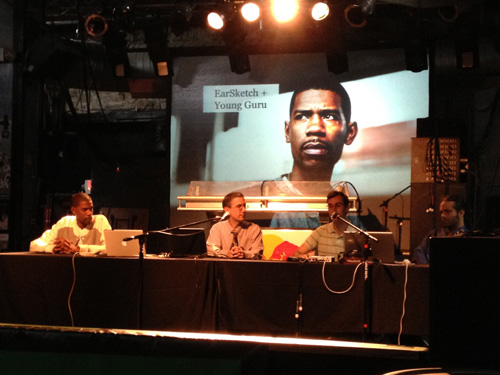
|
Legendary Music Engineer Teams Up with EarSketch to Educate Atlanta Youth
Georgia Tech’s EarSketch is adding a true musical guru to its team. EarSketch, a project that teaches high school students how to write computer code to create musical remixes, is partnering with Gimel “Young Guru” Keaton, who will work with faculty to create new audio content for the program. Keaton has engineered 10 albums for hip-hop superstar Jay-Z.
The announcement was made in Atlanta at the eighth annual A3C Festival, the largest hip-hop festival in the Southeast.
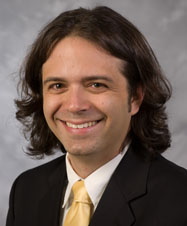 “Young Guru brings a new level of creativity and professional musical expertise to EarSketch,” said Brian Magerko, an assistant professor in the Ivan Allen College School of Literature, Media, and Communication. “Atlanta high school students will have a chance to learn about computer science with help from one of the biggest producers in hip-hop.” “Young Guru brings a new level of creativity and professional musical expertise to EarSketch,” said Brian Magerko, an assistant professor in the Ivan Allen College School of Literature, Media, and Communication. “Atlanta high school students will have a chance to learn about computer science with help from one of the biggest producers in hip-hop.”
“I knew early in my career that giving back and teaching young people were my passions,” said Keaton. “I wouldn’t be here if it wasn’t for professionals taking me under their wing and teaching me the craft. EarSketch is the program that will spark the next great computer or music mind. I’m sure of it. This is why I wanted to be involved.”
EarSketch is a National Science Foundation-funded initiative that was created to encourage high school students to consider computer science careers. The program, now in its second year, is focused on minorities and girls, but with an approach that is intended to have broad appeal. EarSketch utilizes the Python programming language and Cockos’ Reaper, a digital audio workstation program similar to those used in recording studios throughout the music industry.
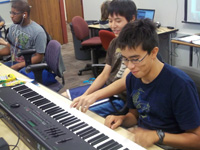 EarSketch was developed and is overseen by Magerko and Jason Freeman, an associate professor in the College of Architecture’s School of Music. EarSketch was developed and is overseen by Magerko and Jason Freeman, an associate professor in the College of Architecture’s School of Music.
“Young people don’t always realize that computer science and programming can be fun,” said Freeman. “Students are using EarSketch to remix samples and loops to express their own creative musical ideas as they learn computer science principles.”
EarSketch had its first test run by Atlanta-area high schoolers during a Georgia Tech summer camp in July. The software and curriculum will be piloted this spring as part of Lanier High School's music technology program.
|
IAC Faculty Present at Advisory and Conference Forums
One fights for reframing our thoughts about games. One cautions us to remember Tech history for the sake of future innovation. One says growth starts locally. Professors from the Ivan Allen College of Liberal Arts make their cases at key October meetings:
___
Steve Usselman, professor and chair of the School of History, Technology, and Society (HTS), was the invited keynote speaker at the semi-annual meeting of Georgia Tech’s Advisory Board. This group of distinguished advisors to President Peterson met on October 19 and 20 to consider the Institute’s research strategy for fostering an "innovation ecosystem" in Atlanta and its region.
Usselman, a historian who has written extensively about institutional change and innovation, described the creation of dynamic ecosystems in locales such as Silicon Valley and reflected upon how those experiences might inform the prospects for success in Atlanta.
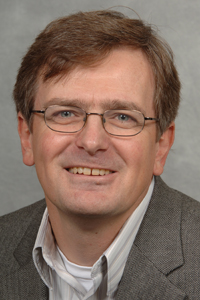 “One of the great challenges for any research university looking to foster such an ecosystem,” Usselman told the group, “is to manage its boundaries creatively. The charge is especially difficult because universities operate within a federalist system. Their leaders must simultaneously attend to developments at the national level, which influence available funding, while also creating opportunities on the local level for fruitful interaction among people from various parts of campus and the surrounding community.” “One of the great challenges for any research university looking to foster such an ecosystem,” Usselman told the group, “is to manage its boundaries creatively. The charge is especially difficult because universities operate within a federalist system. Their leaders must simultaneously attend to developments at the national level, which influence available funding, while also creating opportunities on the local level for fruitful interaction among people from various parts of campus and the surrounding community.”
A key component at the local level is the construction of physical spaces where researchers from industry meet those from the campus community, including students. Another crucial ingredient is a sense of history.
“Institutions such as Georgia Tech cannot simply mimic successes such as Stanford. In building innovative ecosystems of their own, they need to understand their pasts and leverage the cultures they have inherited,” Usselman said.
Georgia Tech, for instance, has a long tradition of providing its students with hands-on exposure to industrial technologies.
“Rather than reject that tradition, the Institute should embrace it, while working to infuse its current ecosystem with a more innovative, entrepreneurial spirit,” said Usselman.
Usselman pointed to moments in the past when Georgia Tech had successfully navigated such transitions, as when it diverted its emphasis from defense to energy research in the 1970s and established a hydraulics laboratory in the 1940s. That lab was housed in the newly constructed Civil Engineering Building, one of many campus facilities built with federal funds under New Deal programs.
___
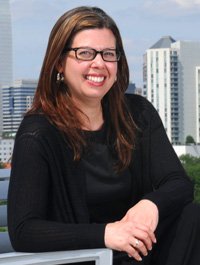 School of Public Policy Associate Professor Jennifer Clark discussed the reinvention of regional economies as high tech engines for growth at the 16th SSTI Annual Conference held in Atlanta October 29-30. School of Public Policy Associate Professor Jennifer Clark discussed the reinvention of regional economies as high tech engines for growth at the 16th SSTI Annual Conference held in Atlanta October 29-30.
Clark recalled that when she first arrived at Georgia Tech in 2005, “my students were very focused on university economic development issues like tech transfer, entrepreneurship, commercialization models, venture capital, etc. There was very little talk about jobs. Now, students are constantly asking me about outsourcing, manufacturing, and job creation.”
“In some sense, university economic development is moving very quickly from the theoretical to the tactical. Increasingly people and the politicians holding the purse strings want to see the jobs, not just the knowledge creation. This, of course, is quite understandable. However, in some sense this shift moves the goal posts in the game of university economic development, and the implications are not trivial. Simply put, universities are in the business of creating knowledge spillovers in the first place. Serving as the R&D infrastructure provider and incumbent worker training provider for industry is an expanded role and an expanded mission. These are new tasks."
“Similarly, helping to shape the narrative of the high-tech region is consistent with what universities do anyway, casting themselves as global actors on an international stage producing world-class research."
“However, attracting FDI, ‘becoming part of the package’ for specific firms rather than a general regional asset, is new set of activities. The consistently expanding role of universities as the institutional incubators of new firms again adds a role that is otherwise not embedded within the educational mission.”
Georgia Tech was a major sponsor for the conference. Clark was one among a distinguished roster of speakers from Tech that included Steve Cross, Executive Vice President of Research, Stephen Fleming and Jan Youtie of Georgia Tech’s Enterprise Innovation Institute (EI2), Rich DeMillo of the Center for 21st Century Universities (C21U), and Marlit Hayslett of GTRI Office of Policy Analysis and Research.
___
How will the global economic crisis be resolved? How are emerging perspectives challenging established modes of global economic governance? Ian Bogost highlighted evolutions in creativity, computer games, and social innovation during the 2012 World Knowledge (Economics) Forum which took place October 9-11.
The largest forum in Asia bringing together international business, scholars, and political and opinion leaders, the 2012 WKF (also known as the Davis Forum) focused on “The Great Breakthrough: New Solutions for Global Crisis - Leadership, Integrity, Creativity, and Happiness.”
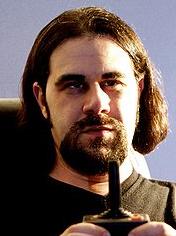 A professor of digital media in the School of Literature, Media, and Communication, Bogost’s presentation “How to things with videogames” made the case that debates about the role of games in popular culture obscure the medium's ability to create complex simulated realities for purposes beyond entertainment. Bogost was also a panelist in two sessions on creativity. "Game=More Than Virtual Reality" focused on the history and future of games and avenues for cultivating their enormous potential as a media and as an industry. Other participants were James Gwertzman of PopCap Games, and Jesper Juul of New York University, with Charles Spence of Oxford University as moderator. In a second panel, Bogost and others explored how social innovation, personal manufacturing and hyperconnectness are changing the way we live, how we do business, and how we enabling a 3rd industrial revolution. A professor of digital media in the School of Literature, Media, and Communication, Bogost’s presentation “How to things with videogames” made the case that debates about the role of games in popular culture obscure the medium's ability to create complex simulated realities for purposes beyond entertainment. Bogost was also a panelist in two sessions on creativity. "Game=More Than Virtual Reality" focused on the history and future of games and avenues for cultivating their enormous potential as a media and as an industry. Other participants were James Gwertzman of PopCap Games, and Jesper Juul of New York University, with Charles Spence of Oxford University as moderator. In a second panel, Bogost and others explored how social innovation, personal manufacturing and hyperconnectness are changing the way we live, how we do business, and how we enabling a 3rd industrial revolution.
|
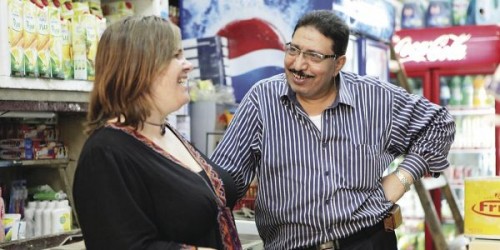
|
Tracing Change in Modern Egypt, Refrigerator by Refrigerator
Laura Bier, assistant professor in the School of History, Technology, and Society, was profiled in the Chronicle of Higher Education on her research for a Fulbright fellowship.
An excerpt follows. Read the full profile here.
"Ms. Bier first visited Egypt in 1991 as a study-abroad student at the American University in Cairo. She fell in love with the Egyptian capital, which she describes as a 'crazy, lively-until-all-hours place.' Her dissertation research and her book—"Revolutionary Womanhood: Feminisms, Modernity, and the State in Nasser's Egypt" (Stanford University Press, 2011)—focused on the feminist movement in Egypt after the 1952 coup.
While that research examined power struggles within Egypt's political elite, Ms. Bier's current work looks at 'changes on the everyday level,' she says. Using advertisements, government archives and statistics, records of trade fairs, and oral interviews with factory and shop owners, she plans to track trends like the spread of particular brands of soda or of household appliances like refrigerators.
Shifts in people's material aspirations are part of historical change, Ms. Bier contends. Take the fortunes of Coca-Cola, for example. It was an imported luxury when it first appeared in Egypt after World War II; banned from 1966 to 1974 as part of a boycott of multinationals doing business in Israel; and then it cornered the market as Egypt moved away from socialism and discontinued subsidies to small domestic soda producers.
But Egyptian historians do not tend to focus on such mundane or contemporary topics, and they generally find her project 'peculiar,' says Ms. Bier.
Source: Chronicle of Higher Education, October 29, 2012
|
IAC Around Campus
Events, Celebrations, and A Final Word
|
GT’s Creative Laboratory: DramaTech Celebrates 20 Years of Innovation in the Dean Dull Theatre
|
|
|
|
What happens when nascent engineers, computer types, and other Techies come together on stage? It is performance magic known as DramaTech. Georgia Tech’s student-run theater is Atlanta’s longest continuously running theater troupe and, on November 3rd, it’s celebrating 20 years of innovation in the Dean James E. Dull Theatre in the Ferst Center of the Arts. When the previous DramaTech space was condemned, Dean of Students James E. Dull (now Emeritus) mounted a campaign for a new theater to be built as part of the Ferst Center. “Dean Dull was a tremendous advocate for DramaTech,” says DramaTech Director Melissa Foulger. “He ensured that our space in Ferst worked, not only for performances, but also as a laboratory where students whose lives revolve around equations and methodology also have opportunity to push themselves creatively.” The Dull Theatre space allows students to experiment in acting and performance, as well as in directing, lighting, sound, costumes, and scenery, and production management. Ty Autry, an electrical engineering major, believes that the value of the experience extends beyond theater knowledge. “DramaTech is an outlet for creative experimentation and expression. It also provides me with a wonderful opportunity to learn to work with deadlines, to collaborate with different majors and a multitude of different personalities. In a way, DramaTech helps me to understand how to operate in the business world.” Begun in 1929, this year's performances in Dull will be attended by more than 2000 people. Shows run in the fall, spring, and summer semesters and feature scripts from the theatrical canon, innovative contemporary pieces, musicals, and improvisation. “No organization does so much for the students of Georgia Tech as DramaTech,” says physics major, Sam Whited. “There is almost never a time, day or night, where there aren’t students busily working in the Dull Theater. For many of us it becomes our home, a place we can return to when our lives are lacking in art.” The draw is strong enough that some remain involved long after leaving Georgia Tech. Stephanie Daigle is a computational media alumna who heads the Friends of DramaTech alumni group. “DramaTech gave me a new family and support system while at Tech, a place to escape the craziness of Georgia Tech,” she said. “I gave a lot of time and dedication to DramaTech and it gave a ton back - a husband and lifelong friends!” All are invited to the celebration of DramaTech’s 20 years in the Dull Theater on November 3rd. Events will begin at 4 pm with performances by DramaTech troupes, Let’s Try This! and VarietyTech. The event will also feature guest speakers and a reception before the 8pm performance of Neil Simon’s Laughter on the 23rd Floor. The DramaTech Season Begun in 1929 as the Marionettes, DramaTech, today, is in production almost year-round. Fall Semester Black Box Comedy Festival featuring nationally known comedians and improvisers VarietyTech, an annual variety show Large-cast theatre production that runs for 3 weeks Let’s Try This! bi-weekly comedy improv shows Spring Semester A musical production and small cast play Let’s Try This! bi-weekly comedy improv shows Summer Semester Smaller scale productions In addition to scripted shows, DramaTech classes and workshops with professionals are offered through the School of Literature, Media, and Communication, Ivan Allen College, which houses the program. |
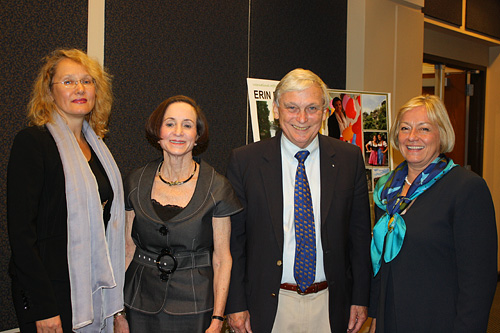
|
Guten Tag! Modern Languages Celebrates German Day at Georgia Tech!
Pictured are Modern Languages Chair Dina Khapaeva (l) with Marnite Calder, Barry Spurlock, and Bettina Cothran (r), the organizer of German Day.
Guten Tag! was the greeting of the day October 23rd as the School of Modern Languages celebrated German Day on campus.
A highlight of the day-long celebration was the panel “An Education for Global Competence: The Case of Germany and the U.S. Meet.” Participants included leaders from German industry, Ivan Allen College faculty, and benefactors of the school’s German study abroad programs.
Among those attending the day’s events were Gail and Barry Spurlock who, this spring, endowed the Gail R. and Barry L. Spurlock Study Abroad Scholarship Endowment in the School of Modern Languages. Funded in perpetuity, the $50,000 endowment supports students of German and of the German Languages for Business and Technology (LBAT) programs to study for a semester in Germany. Barry Spurlock also participated as a panelist.
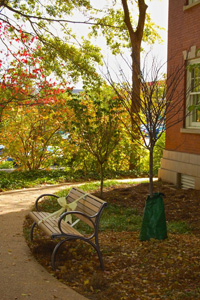 Marnite Calder, Executive Director of The Halle Foundation, also participated during the day. A three-year grant from The Foundation supports the German programs. During the panel, Calder noted founder Claus Halle’s personal commitment to advancing German- American relations. Marnite Calder, Executive Director of The Halle Foundation, also participated during the day. A three-year grant from The Foundation supports the German programs. During the panel, Calder noted founder Claus Halle’s personal commitment to advancing German- American relations.
Earlier in the afternoon, a ceremony was held in the Swann building garden to dedicate a commemorative bench honoring former Modern Languages Chair Phil McKnight who passed away last year.
German Day sponsors included Deutsche Bahn, EBD Group, Grenzebach, Spurlock & Associates, and The Halle Foundation.
|
Public Policy PhD Students Receive Prestigious Awards
One current doctoral student and one recent graduate of the School of Public Policy have been honored with prestigious opportunities and awards related to their dissertation research.
Li Tang, a 2011 PhD program graduate, has won the Association for Public Policy and Analysis (APPAM) Award for Best Dissertation in Public Policy and Management in Asia (2011-2012). Joy Wang has been awarded an EPA STAR graduate fellowship to support her doctoral studies.
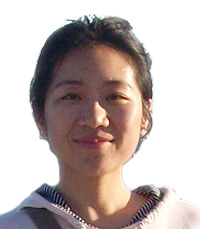 Tang will be invited to the APPAM Conference (November 8-10, 2012) in Baltimore, MD, to receive the award. Offered on an annual basis, the award aims at "educating and training the next generation of Asian policy-makers and leaders." Her dissertation topic is "U.S.-China Collaboration, Knowledge Moderation, and the Rise of China in Nanotechnology." Li's dissertation supervisor was Philip Shapira. Tang is now an Assistant Professor in the School of Public Economics and Administration, Shanghai University of Finance and Economics. Tang will be invited to the APPAM Conference (November 8-10, 2012) in Baltimore, MD, to receive the award. Offered on an annual basis, the award aims at "educating and training the next generation of Asian policy-makers and leaders." Her dissertation topic is "U.S.-China Collaboration, Knowledge Moderation, and the Rise of China in Nanotechnology." Li's dissertation supervisor was Philip Shapira. Tang is now an Assistant Professor in the School of Public Economics and Administration, Shanghai University of Finance and Economics.
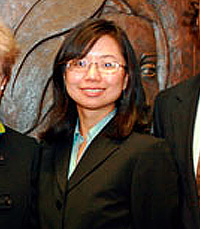 Wang is being advised by Marilyn Brown on her dissertation research, which will examine the impact of information - like that provided by smart meters - on consumer behavior and energy use. The EPA STAR fellowship is a generous, highly competitive program to support advanced degrees in environmental studies. Each year, students in the United States compete for STAR fellowships through a rigorous review process. Students can pursue degrees in traditionally recognized environmental disciplines as well as other fields such as social anthropology, urban and regional planning, and decision sciences. Since the program began in 1995, EPA has awarded approximately 1,500 STAR fellowships to students in every state and most territories. Wang is being advised by Marilyn Brown on her dissertation research, which will examine the impact of information - like that provided by smart meters - on consumer behavior and energy use. The EPA STAR fellowship is a generous, highly competitive program to support advanced degrees in environmental studies. Each year, students in the United States compete for STAR fellowships through a rigorous review process. Students can pursue degrees in traditionally recognized environmental disciplines as well as other fields such as social anthropology, urban and regional planning, and decision sciences. Since the program began in 1995, EPA has awarded approximately 1,500 STAR fellowships to students in every state and most territories.
|
President's Undergraduate Research Award Winners
|
|
Congratulations to the six Ivan Allen College of Liberal Arts students who are recipients of President's Undergraduate Research Awards (PURA) for Fall and Summer 2012. Fall 2012 Casey Aultman (International Affairs/Modern Languages): “Spanish and English Mixing in Social Media.” Faculty Mentor: Dr. Cecilia Montes-Alcala Benjamin Belden (History, Technology, and Society): “TRICYCLE and the Pearl Harbor Question: Routine Espionage or a Warning Ignored?” Faculty Mentor: Dr. Kristie Macrakis Chelsea Howell (History, Technology, and Society): “The Sociology of Diagnosis: Polycystic Ovarian Syndrome (PCOS).” Faculty Mentor: Dr. Jennifer Singh Elise Livingston (Literature, Media, and Communication): “EarSketch: Computational hip-hop remixing and sharing as a tool to drive engagement and interest in computing.” Faculty Mentor: Dr. Brian Magerko Kelly Snyder (Literature, Media, and Communication): “Optimizing Project Management of Long Term Projects with Short Term Workers.” Faculty Mentor: Dr. Celia Pearce Summer 2012 Elise Livingston (Literature, Media, and Communication): “EarSketch: Computational hip-hop remixing and sharing as a tool to drive engagement and interest in computing.” Faculty Mentor: Dr. Brian Magerko Paige Clayton (Public Policy): "One city, three universities, multiple models of technology commercialization." Faculty Mentor: Dr. Shiri Breznitz |
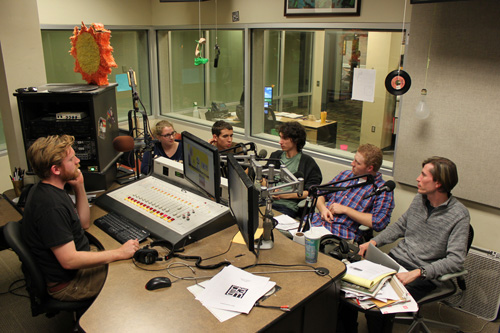
|
Liberal Arts Meets Science at the Georgia Tech Sci Fi Lab
Does a dependency on a smart phone make you a cyborg? Does riding a bicycle? What about throwing spears at wooly mammoths?
The people behind the mics at Georgia Tech Sci Fi Lab are deep in discussion. It’s Two-Minute Madness time on the WREK radio show. The hosts and special guests speed- talk through mentions of Dr. Who, iPhones, Lance Armstrong, Luke Skywalker, Neanderthals, the Six Million Dollar Man, Star Trek, Terminator, and zombies – all in the quest of determining, what, specifically, makes something a cyborg.
“We can say that this week's topic is ‘cyborgs,’ for example, but that can mean different things to different people: from Darth Vader, to Google Glass, to Daft Punk,” said Adam Le Doux, program manager and a host of the show. When not on the air, he’s a computational media major, a joint studies program between the College of Computing and the School of Literature, Media, and Communication (LMC) in Ivan Allen College of Liberal Arts. LMC is one of the coordinators of Sci Fi Lab along with the Georgia Tech Library and WREK 91.1 FM.
 Since 2006, Sci Fi Lab has taken to the radio waves to discuss all things science fiction. Every Thursday at 7 p.m. a group of culture studies researchers and computer thinkers gather to discuss the spectrum of science fiction. Since 2006, Sci Fi Lab has taken to the radio waves to discuss all things science fiction. Every Thursday at 7 p.m. a group of culture studies researchers and computer thinkers gather to discuss the spectrum of science fiction.
The show has been picking up traction with the science fiction community, both locally and nationally.
"Six years into the program, we find that now we're approached by authors and artists who want to appear on the show, and we've even been studied in the University of Liverpool's grad program in Science Fiction Studies as an example of living science fiction," said Lisa Yaszek, a professor in LMC and a behind-the-scenes Sci Fi Lab organizer.
October’s guests included players from the Atlanta Radio Theater Co., the director of an independent zombie apocalypse film, Georgia Tech computing professors, and actor Frank Langella from “Robot and Frank.”
“We try to cover the best in current and popular science fiction from all media – literature, film, television – and we try to tie that in with the real science and research that occurs on campus every day,” said Justin Ellis, who shares hosting duties with Le Doux.
Ellis serves as associate producer for the show and works at the Georgia Tech Library. His time on the development committee for the science fiction collection connected him with Yaszek. She thought there was a strong role for the library to provide academic foundations for the show. Ellis signed on.
“I think the fact that we try and tackle both the ‘pop’ side – literature and entertainment – and the real science, research side is one way to bridge the gap between the sciences and the liberal arts,” said Ellis. “Many of the topics discussed in Sci-Fi literature and media are extrapolated from, or have some root in, real science.”
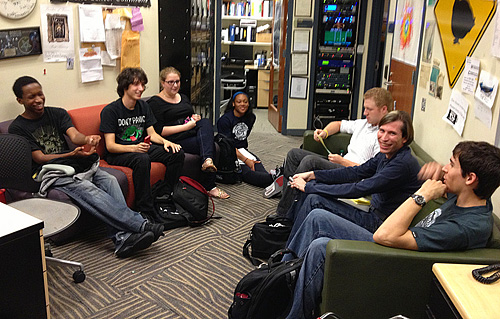
At the start of two-minute madness during the cyborg hour, Ellis shares his enthusiasm for wearable computing. He muses that he would be game for a cybernetic implant in his arm.
Le Doux quickly counters that that could be problematic in a light saber battle.
It’s a discussion that underscores how Le Doux describes the show, as “a living laboratory for the intersection of liberal arts and science.” It’s a concept with which he identifies personally.
“My studies are evenly split between computer science and the liberal arts – communication, culture, design – so this kind of ‘cross-pollination’ is something I'm into,” said Le Doux.
It’s also something that’s unique to Georgia Tech and its students. Sci Fi Lab is one way to expand that intersection beyond the campus and into the greater community.
“In the wider culture we tend to have a gap between the arts and the sciences, but both sides would gain a lot if they worked more closely together, and I like to think there is an increasing awareness of this,” said Le Doux. “I think what makes the Sci Fi Lab unique are the combined perspectives of the participants.”
During the cyborg hour, Justin Ellis interviewed Georgia Tech faculty about their work. In a telling demonstration, Thad Starner, associate professor in the School of Interactive Computing, challenged Clint Zeagler, a research scientist in the College of Architecture, to a picture race. Starner tapped his Google Glasses and secured a photo nearly instantaneously. Zeagler was forced to wait for his phone to turn on before launching a photo app.
Then they talked about getting inspiration from fashion design and Terminator movies. The intersection of arts and science is unavoidable. Sci Fi Lab serves as the petri dish for deeper investigation.
Sci Fi Lab airs weekly on Thursdays at 7 p.m., WREK 91.1 FM. Archived shows can be found at www.wrek.org/scifilab. Photos courtesy Jason Ellis.
|
|

